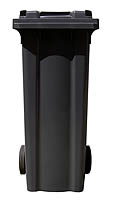Household refuse
How to use your refuse bin

Most households will have a wheelie bin with a dark grey or black lid and embossed with one dot for their general household waste.
We operate an alternate weekly refuse collection. This is part of our drive to help reduce waste and boost recycling across Adur and Worthing, which is currently only at 36%.
Please make sure:
- your bin is ready for collection by 6:30am on your collection day
- your bin is left on the kerbside nearest your home, and is accessible from the road
- there is no additional waste left next to your bin (the only times additional waste will be collected are after a bank holiday, or following a missed collection due to adverse weather)
- once your collection has taken place, bins must be removed from public highway / footpaths and be taken back within your property as soon as possible after collection on the same working day
What can't go in your refuse bin:
- anything that can be recycled
- electrical items:
- small electrical items can be left out with your bins for recycling - for details see WEEE (Waste Electric and Electronic Equipment) collection service
- larger items should be taken to the tip
- garden waste
- hazardous waste
- clinical waste
If you have a compost bin then fruit and vegetable peelings etc can be put in that - see how to reduce waste.
Keeping your bin fly, maggot and smell free
These simple steps can help prevent flies, maggots and smells in your rubbish bin:
- Make sure all food waste is bagged, including pet food before it goes into the bin.
- Flies lay their eggs directly onto food waste. This can happen either in the bin or in the kitchen if food is left uncovered. It is a good idea to double bag any meat, fish or dairy waste.
- Squeeze any air out of bags as you tie them. This will help to slow down the decomposition and reduce smells.
- If possible, keep your bin out of direct sunlight.
- Make sure you are recycling everything you can, this will help to reduce the waste in your rubbish bin and enable you to keep the lid closed, see: What you can recycle.
- Reduce food waste. Did you know that food waste makes up almost 40% of the waste we collect from households in Adur and Worthing and approximately 28% could have been eaten! You can find advice, tips and recipes to help you reduce food waste and save money, see: Love food, hate waste website.
- If you have children in nappies, please empty any solids into the toilet and double bag them before placing into the bin. For more information about alternatives to disposable nappies see NCT website - reusable nappies or disposable nappies?
Other tips:
- You can compost lots of your food waste at home, reducing the amount in your rubbish bin. Discounted compost bins are available through the Get Composting website, see also home composting.
- Tea tree and citronella act as good deterrents for flies. Spraying your bin lid with essential oils can help.
- Some natural herbs can also deter flies. You can place sprigs of elder, lavender, mint, pennyroyal, rue or southern wood in the bin or bin lid, or hang them up around the bin to keep flies away.
- Pungent food waste, such as fish heads, can be wrapped up and put in the freezer until your bin collection day. Put it into the bin just before you place it out for collection; this simple measure will prevent the food waste decomposing in the bin in-between collections.
- Disinfectant sprays and gels are available to keep your bin smelling fresh.
How do I get rid of maggots?
- Maggots and fly eggs can be killed by using boiling water and readily available cleaning products (always read the label).
- Clean and wash your bin out after it has been emptied. Professional bin cleaning companies are available.
- Try using a cleaning product with a fragrance, which will help to deter the flies from your bin.
Disposing of large items
If an item is too large to fit in your bin you can take it to the tip.
If you are unable to take it to the tip yourself we offer a bulky waste collection service.
Cooking oil, fat and grease
Oil, fat and grease should not be put down the drain. Even if it can be broken down with hot soapy water, it can resolidify once cooled and block drains and sewers.
- Let fat cool down until it is solid, then wrap it up and put it in with your rubbish
- Allow used oil to cool, then pour into a container and take it to your local tip where it can be recycled
- Wipe residual oil out of frying pans or oven trays with a paper towel and put it in with your rubbish
To avoid blocking your drains, follow Southern Water's advice on:

Need assistance with this service?
Get in touch:
Recycling, Refuse & Waste (including bin day queries)
Page last updated: 10 September 2024


 01903 851729
01903 851729